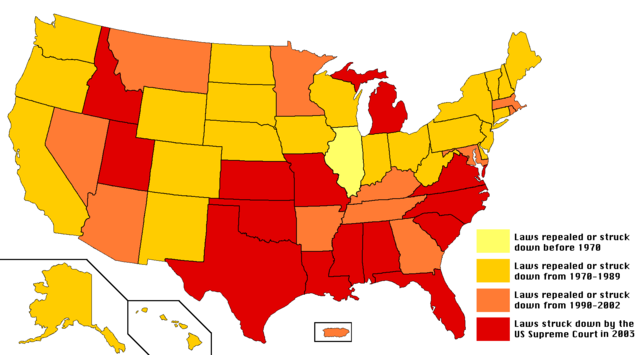It's not something most people are aware of, but given how recently it was still constitutional to ban sodomy, it's not that surprising.
Last week, the Advocate reported some troubling news out of Louisiana: Since 2011, at least a dozen men have been arrested on a count of “attempted crimes against nature”—that is, an offer to have sex with another man. Even worse, the arrests were part of a sting operation in which undercover officers propositioned men, lured them into an apartment, then promptly arrested them and brought them to jail. The latest arrest occurred on July 18.
Sound retro? It is and it isn’t. On the one hand, Louisiana’s actions are patently, almost comically unconstitutional. It’s been a decade since the U.S. Supreme Court ruled in Lawrence v. Texas that “the liberty protected by the Constitution allows homosexual persons the right ... [of] intimate conduct with another person.” That 6–3 ruling struck down every anti-sodomy law in the country, legalizing homosexuality—as well as any kind of sexual contact between consenting adults, gay or straight.
On the other hand, rejecting Lawrence has long been in vogue in red states. Ten years after Lawrence, 13 states, all of them red or red-leaning, have kept their anti-sodomy laws on the books. And three of them—Kansas, Oklahoma, and Texas—explicitly outlaw consenting sex between people of the same sex. In much of red-state America, then, being gay remains officially illegal.
If these laws lingered as unenforced, outdated relics, they might not be such a big deal. Sure, anti-sodomy statutes present a significant affront to the “personal dignity and autonomy” Justice Anthony Kennedy wrote about in Lawrence, but plenty of obsolete state laws remain on the books long after their expiration dates. Yet these laws aren’t merely symbolic. Same-sex couples in North Carolina and Texas have been arrested for “homosexuality conduct” in recent years. And as the Louisiana debacle illustrates, overzealous law enforcement officers feel enabled by the law to arrest, prosecute, and generally humiliate gay people simply for being gay.
The continuing presence of anti-sodomy laws can’t be blamed on absentminded legislators, either. Equality advocates have mounted significant efforts in all 13 states to repeal these laws in the wake of Lawrence—efforts that failed in the face of conservative resistance. In Virginia, the endeavor actually backfired: An attempt to revoke the state’s “crimes against nature” statute led the legislature to reaffirm the anti-sodomy law—more than a year after Lawrence.
Virginia’s law has returned to the spotlight in recent months as Ken Cuccinelli, the state’s current attorney general, has centered his gubernatorial campaign on an effort to enforce Virginia’s Crimes Against Nature law. Cuccinelli was integral to the defeat of the 2004 repeal bill, and nearly a decade later, he remains strangely fixated on an issue settled long ago by the highest court in the land. He’s even prosecuted a case based on the state’s anti-sodomy laws, all the while insisting that his efforts are directed against all forms of sodomy, not just same-sex intimacy. (Never mind that the would-be governor is on the record describing “homosexual acts” as “intrinsically wrong” and “not healthy.”)
There’s no easy legal remedy for these holdout states. The Supreme Court can render state laws unenforceable, but they can’t officially remove them from the books. And though lower courts consistently shoot down attempts to revive anti-sodomy laws, reactionary politicians and homophobic police chiefs will almost certainly continue to use these laws to intimidate and denigrate gay citizens. A decade after the Supreme Court found that matters of sexual intimacy are “central to the personal dignity and autonomy” guaranteed by the Constitution, too much of red-state America still formally outlaws homosexuality. And there doesn’t seem to be anything anybody can do about it.
This is a map of current anti-sodomy laws in the US, all of which are
unconstitutional. (The map is slightly out of date, since Montana
repealed its law.)
Remember, these laws were only ruled unconstitutional about a decade
ago. A generation ago, half of the country still outlawed sodomy. There
are people alive today whose relationships were against the law where they lived for most of their lives. Here is a map of the repeals of sodomy laws. Notice how many didn’t repeal their laws until the 1990s.
Even if laws are frequently waved, and few to no prosecutions
actually result, and the use of the laws are erratic, laws which outlaw
consensual sex between adults are dangerous and repressive. If a man has
a gun pointed at your head, even if he doesn’t fire it, even if you
know he probably won’t fire it, even if shooting you is technically
illegal, the mere presence of that gun is traumatizing and oppressive.
It changes how you think and behave.
Given how recently this was
relevant to so many LGBT+ people across the US, you’d think there’d be
more awareness and sympathy among the community for other groups who
face this reality daily, but recently there’s been a lot of progress for
the LGBT+ community socially and legally, and people have surprisingly
short memories.


No comments:
Post a Comment